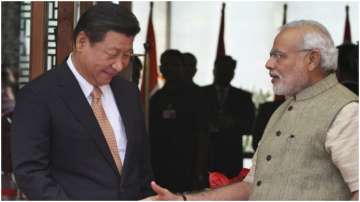India-China tension: Answer to present crisis may be hidden in history
We have not learnt our lessons from history. Only the historians have. It may appear repetitive to go over 1962 war and situation at that time but such a discussion is not entirely irrelevant.

We have not learnt our lessons from history. Only the historians have. It may appear repetitive to go over 1962 war and situation at this time but such a discussion is not entirely irrelevant.
At that time Bhola Nath Mullick was Jawaharlal Nehru's spymaster (Mullick received Padma Bhushan in the year 1964). Many critics say that Mullick had failed to tell Nehru about China's possible aggression. But in his book titled 'My Days with Nehru', Bhola Nath Mullick has clearly said that he had indeed told Nehru about possible Chinese attack.
Mr Srinath Raghavan from Center for Policy Research says that at the time of friction between India and China, several groups of intelligence sleuths used to look after internal and foreign security affairs. Research and Analysis Wing (RAW) had not been formed by that time. Indira Gandhi formed it later on.
Bhola Nath Mullick's spy team handed a report to PM Nehru in 1962 saying that some Chinese activities were taking place. The report said that China was trying to assert its strength.
Many fact-based reports were sent. In these reports, Mullick had mentioned how Chinese consulates told communists in Calcutta that China wanted to capture a portion of Ladakh. Mullick relayed this information to the Prime Minister and even Home Minister. PM then asked Intelligence Bureau to gather more info although the work was to be done by the Joint Intelligence Committee.
The Intelligence Bureau, after analysing the situation sent a report saying the Chinese Army could occupy areas along the border where Indian Army was not deployed.
The report was presented on December 26, 1961. The war between India and China took place in October 1962.
Jawarharlal Nehru committed what is known as the 'Himalayan Blunder'. Did Narendra Modi step into the same trap? Has Xi Jinping deceived Modi the same way Mao Zedong deceived Jawaharlal Nehru?
Nehru's 'Tibet Policy' had some basic flaws. In 1950, Tibet was urging United Nations for recognition as a sovereign country. Since Tibet was not a member of the UN, such requests were recorded by UN as ones being made by an NGO. Tibet appealed to India to take up the issue with the UN but Nehru, who did not want to anger China steered clear and asked Tibet to discuss this with China. In Beijing, Indian Ambassador KM Panikkar didn't even accept in his report that Chinese army had intruded in Tibet. On the other hand, India was keen for China to get included in the UN.
In 1954, India and China signed the Panchsheel Agreement. Tibetan spiritual guru Dalai Lama had mixed feelings about this which he mentioned in his book 'Freedom in Exile'.
Even Dr Babasaheb Ambedkar had a different opinion than Jawaharlal Nehru. If Mao truly believed the Five Principles of Peaceful Co-existence, felt Ambedkar, he would not have treated Chinese Buddhists the way he did.
The Panchsheel Agreement did not resolve the border dispute.
In his book ‘India- China Boundary Problem 1846-1947: History and Diplomacy’, respected lawyer AG Noorani has said that Lord Mountbatten, the last Viceroy of India, had mentioned in his report that the border was 'undefined'.
Mountbatten was hurrying to return to England in 1947 and the border issue remained unresolved. Nehru tried his best to sort out the issue but it did not happen.
India's military manoeuvre in 1962 before the war is an area of dispute as well. These manoeuvres angered China.
In his book 'Beyond the Lines', Kuldeep Nayyar points out that Nehru had instructed the construction of 64 check posts on the border with China.
During that period, Indian leaders failed to spot the Chinese game even as discussions between the two sides continued. When Nehru met Chou en-Lai in the 1950s, he mentioned rectification of the map but Chou en-Lai claimed that it was a map made by the 'Kuomintang' government and that it had not been reviewed. However, he cleverly avoided accepting that the map was wrong and needs to be changed.
In his book 'How India sees the world', former Foreign Secretary Shyam Saran says that after his meet with Chou en Lai, Nehru thought that he had accepted Indian view.
What was China's position on Kashmir? Before 1962, Foreign Secretary RK Nehru had met Chou En-Lai in Beijing. Chou en-Lai was able to keep RK Nehru under false assumptions.
Was China slanting more towards Pakistan? Did China feel that Jammu and Kashmir was an area under dispute?
In his replies, Chou en-Lai asked Indian side whether China had ever said that Indian sovereignty over Jammu and Kashmir was recognised.
The Indian side should have pressed China more to get a clear statement rather than cryptic language but we fell prey to Chinese tactics and thought we had Chinese assurance.
What is happening in Ladakh is perhaps the toughest chapter in India-China relations. It is a ray of hope given that both countries have agreed to disengage.
Nehru did not pay enough heed to Bhola Nath Mullick's reports. He was a good, simple man. But by getting dragged into Panchsheel, he failed to understand the Chinese game.
Xi Jinping had visited India recently, PM Modi welcomed him happily. I do not think that this hospitality was misplaced but I hope PM Modi learns lessons from mistakes India made in the past.
As Confucius has said we all need to learn from the past if we want to turn our future heavenly.
ALSO READ | India Vs China: Doval, Wang Yi speak over phone, agree to ensure complete disengagement of troops along LAC